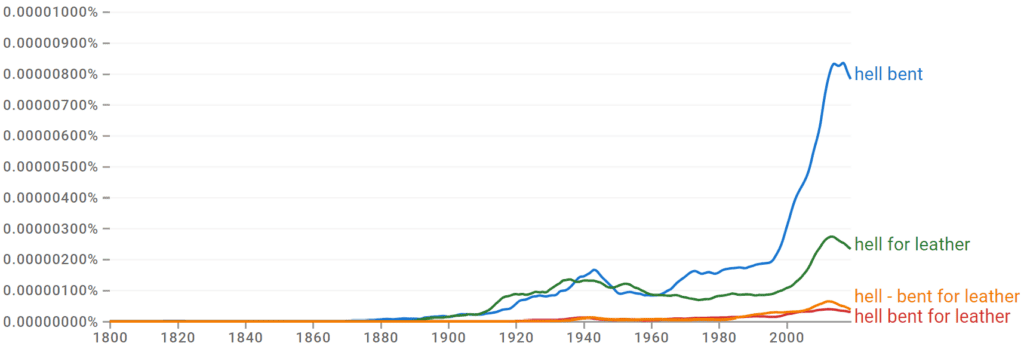Hell-bent for leather, or simply hell for leather, is an idiom that hints at acting recklessly or quickly to achieve a goal. The term “hell-bent” has been around since the 16th century. The addition of “for leather” is a more recent update, but it’s not strictly necessary.
An idiom is a figure of speech that adds detail and clarity to speech and writing. However, idioms can be confusing if the listener or reader doesn’t understand the reference.
Read on to learn about the history behind the term “hell-bent for leather” and how you can use it to express an intense focus or determination.
Hell for Leather vs. Hell-Bent for Leather Meaning

There is no difference between hell for leather and hell-bent for leather. Both phrases are variations of the original term “hell-bent,” which implies recklessness or foolishness.
Both hell for leather and hell-bent for leather are figuratively used to highlight a quick, possibly reckless determination to succeed at some goal, no matter the cost.
Interestingly, the word leather is a recent addition and can easily be replaced by other words. For example, hell-bent for election is popular and has been used to describe hyper-focused and aggressive political campaigning. But any word can replace leather to highlight a recklessness or intense action towards a goal.
Here are some examples to illustrate:
- I don’t know where they are heading at those speeds, but the traffic on the interstate was definitely hell-bent for leather this morning.
- If you hadn’t been so hell-bent on finishing, you might have noticed the mistakes in the presentation and made the corrections needed for a better grade.
- Her students were hell for leather to complete the final exam so they could be released early for the break.
Should I Hyphenate Hell For Leather?
Hell-bent is a compound adjective, so it’s often hyphenated to show that the two words modify a noun or noun phrase. In contrast, hell for leather is usually not hyphenated because it’s not a compound adjective.
That said, you can also find hell bent written without a hyphen. This is because the phrase has been in use for a long time in both forms. Ultimately, choosing to use a hyphen is up to the writer.
Hell-Bent for Leather Origins

As mentioned above, hell-bent proceeded the rest of the words and was first found in an Elizabethan play called “The Bugbears,” produced in 1566. The line goes:
“Brancatius her father is content but my master Amedeus is so hellishely bent on the muck of this world, on his pelfe & his drosse that of three thousand crownes he wyll not bate a crosse of rownd redy payment in dowry to bringe with her.”
In 1731, Ebenezer Cooke used the term “full bent” in his poem “The Maryland Muse,” which is likely a synonym for “hell-bent”:
Of Ab-origines in Arms,
Who far and near did then resort,
In Haste to Susquehanna Fort,
Full bent on Thoughts of Massacre,
To cut off ev’ry Marylander.
The term hell-bent was fully printed in 1824 in “A Narrative of the Life of Mrs. Mary Jemison,” describing savages who were “hell-bent” on carnage.
“It was then, that casting his eyes through the window by which he sate [sic], he discovered that he was in the midst of a large encampment of savages, hideously painted, and “hell-bent” on carnage.”
By 1882, “hell-bent for election” appeared in the St. Louis Post-Dispatch, emphasizing intense focus:
“I was sitting at the window all this time, and my attention was attracted by Gov. Perkins going down the street hell bent for election.”
Rudyard Kipling used “hell for leather” in his 1889 story “The Story of the Gadsbys.” The phrase likely refers to riding hard and fast, with “leather” possibly alluding to the saddle:
“Here, Gaddy, take the chit to Bingle and ride hell-for-leather. It’ll do you good.”
The complete expression “hell-bent for leather” didn’t surface until the early 1900s. It appeared in October 1912 in the Riverside Enterprise, a California newspaper:
“When Becker took the family name and guaranteed to keep the same from shame and stain and blame in every kind of weather, he never dreamed the time was near when everyone he held most dear would look at him through eyes of fear and run hell bent for leather.”
Let’s Review
A variation of the term hell-bent has been around since at least the 16th century, providing audiences with a figurative use meant to portray somebody intent, possibly recklessly, on a goal.
Over the years, the phrase has been applied to various scenarios, from political races to speedy travel. The added term “for leather” likely refers to horseback riding, emphasizing the fast pace by alluding to a leather saddle.
Today, phrases like hell-bent for leather and hell for leather are commonly used to highlight either rapid movement or reckless behavior.
Want to have more idioms in your arsenal? Check out some others we covered:
